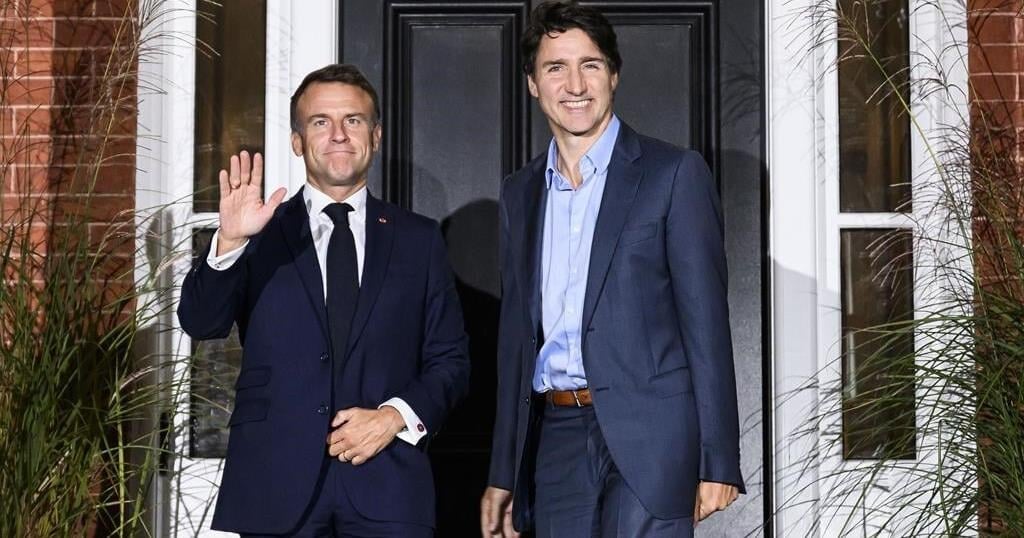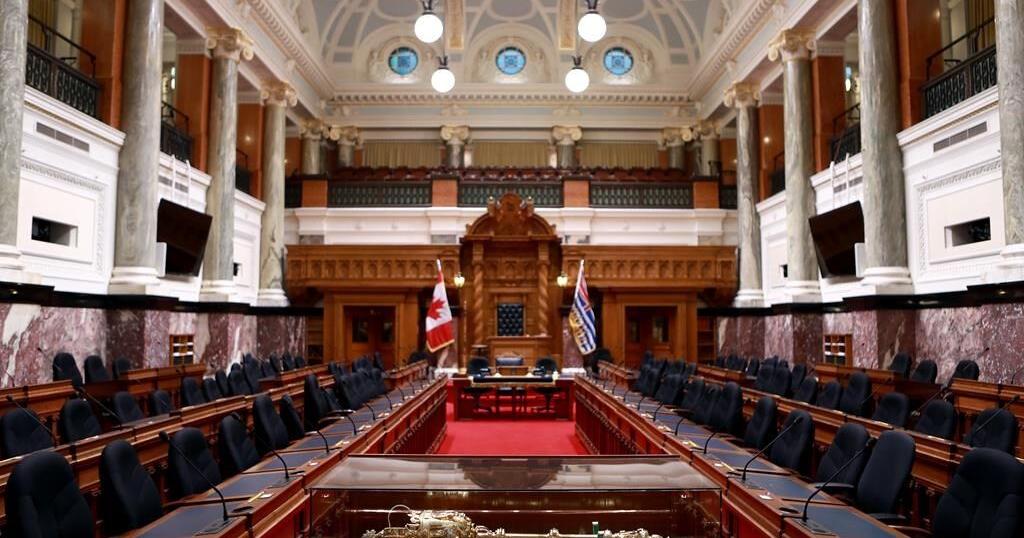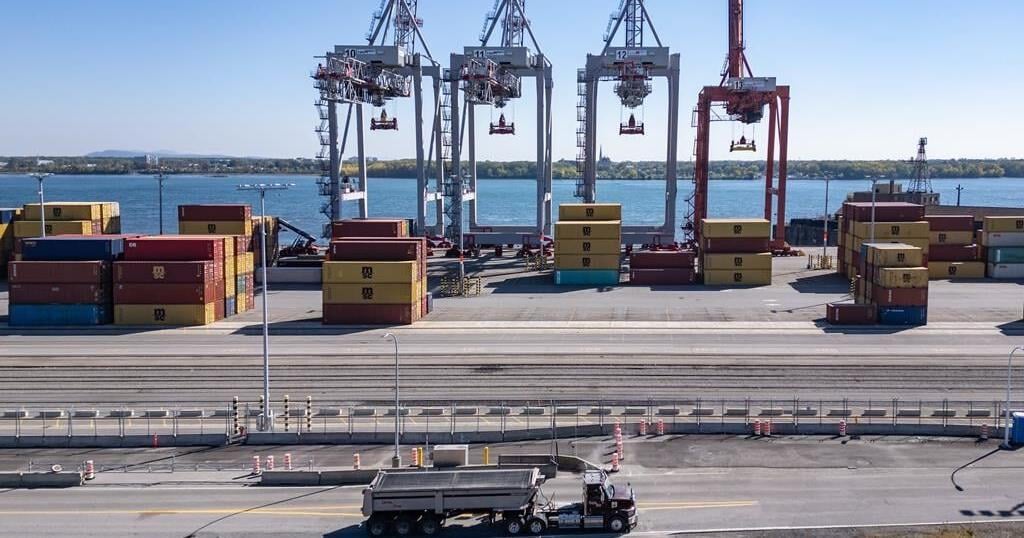OTTAWA – French President Emmanuel Macron and Prime Minister Justin Trudeau say their governments will collaborate more on issues ranging from the war in Ukraine to foreign interference, as they face off against rising populism and misinformation.
“In these troubled times, we have an agenda that is extremely aligned,” Macron said in French during a Thursday visit to Parliament Hill, thanking Trudeau for “the hospitality and especially the shared vision.”
Macron arrived Wednesday evening for a short visit to Ottawa and Montreal, with the pair discussing a slew of issues ranging from the French language and ocean protection to the gang crisis in Haiti and defence.
On Haiti, Macron hinted France might finally meet two years of demands from Trudeau that Paris sanction some of Haiti’s political and economic elites, whom Canada and the U.S. have barred from financial transactions on the basis of support for gangs that are terrorizing the country.
“We will take the necessary actions in terms of sanctions or equipment, as we have discussed ourselves (in France) and within European bodies,” Macron told reporters in French.
The pair also talked about escalating violence between Israel and Lebanon, and an effort led by France and the U.S. for a three-week ceasefire, which Israel has rejected despite support from G7 countries and Gulf states. Macron said he didn’t see that initial rejection as Israel’s final response to the proposal.
The visit follows a March vote by France’s senate to reject the European Union’s trade deal with Canada, against Macron’s wishes.
He said “tempers flared” over the deal, known as CETA, but he is confident the deal will be fully implemented, noting that most of it is operational and boosting trade for both France and Canada.
“If someone is against CETA today, it is someone who never wants to make trade agreements with anyone again, because it has the best standards of any (deals) that we have ratified,” Macron said in French.
After the formal meeting on Parliament Hill, Macron flew to Montreal, where in addition to the news conference he attended a discussion on artificial intelligence with Trudeau and met with Quebec Premier François Legault.
Both governments have overseen measures that limit the role of religion in the public sphere.
Since 2004, France has had a law banning conspicuous religious symbols and garments in public schools, including hijabs and kippahs as well as large Christian crosses. Such policies have inspired laws like Quebec’s Bill 21, which since 2019 has blocked Muslim women from a slew of government jobs.
Macron lamented that France’s policies have been caricatured in the English-speaking world and caused divisive debates. “The French model of secularism is not a model of exclusion of religions,” Macron said, while stressing that France doesn’t impose the model on other countries.
“If it inspires (others) I welcome it, but everyone must pursue their model in a democratic way,” he said, based on local history and living together in harmony.
Both Trudeau and Macron have faced a rise in populist movements and discontent that has challenged each country’s policies on climate change and immigration. This summer, Macron’s allies lost control of the national legislature in a snap election that saw a rise in turnout for left- and right-wing parties.
Trudeau’s government has had a sustained slump in the polls amid frustration over housing costs made worse by a boom in short-term immigration.
Meanwhile, both leaders endorsed a joint statement Thursday on a “stronger defence and security partnership.”
The statement builds on work dating back to the D-Day landings 80 years ago, and pledges to “fight against foreign interference and information manipulation.”
It pledges to “strengthen our co-operation in the area of military equipment support to Ukraine and training” and stick with ongoing work to bring home children abducted by Russia.
“Canada and France will support Ukraine for as long as it takes to thwart Russia’s war of aggression,” reads the statement, which unlike some previous Canadian statements does not mention outright victory for Ukraine.
Both leaders say the statement “will enable us to provide more effective support to Ukraine.”
In the Indo-Pacific, both countries will beef up “strategic and military analysis” and study opportunities for joint patrol missions, such as possibly integrating Canadian support in the deployment of a French aircraft carrier.
The two countries will also increase communication to better respond to “foreign interference operations and information manipulation.”
Later Thursday, a group of protesters waved Palestinian flags and shouted “Shame on you!” near the blocked-off Old Montreal street where the two leaders attended an evening reception in the presence of a few hundred politicians and dignitaries.
In their remarks at the event, Trudeau and Macron took turns painting themselves and their countries as friends and allies who share a common vision on issues including climate change, global armed conflicts and technological change.
“This solid friendship, we need it more than ever, for ourselves and the challenges we face,” said Macron, who concluded his speech with “Long live the friendship between Canada and France!” before he and Trudeau exchanged hugs and went into the crowd to greet the guests.
Macron and Trudeau were in New York earlier this week for the opening of the United Nations General Assembly, and they will meet again next week, this time in France, for the Francophonie summit.
Macron last visited Canada in 2018 for a meeting of the G7 leaders, but a French president hasn’t made an official, stand-alone visit to Canada in a decade.
This report by The Canadian Press was first published Sept. 26, 2024.
—With files from Émilie Bergeron and Morgan Lowrie in Montreal.
























